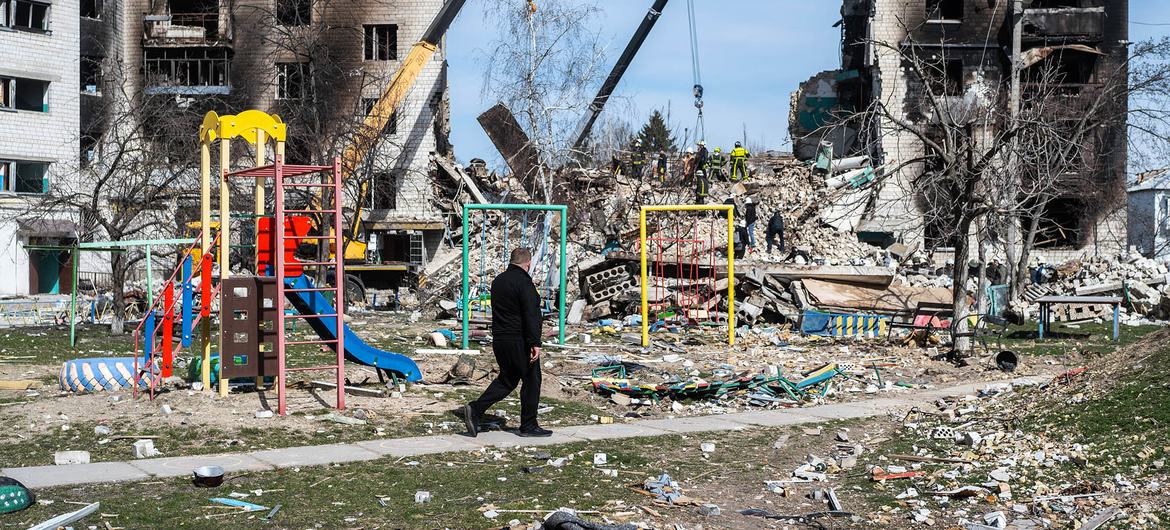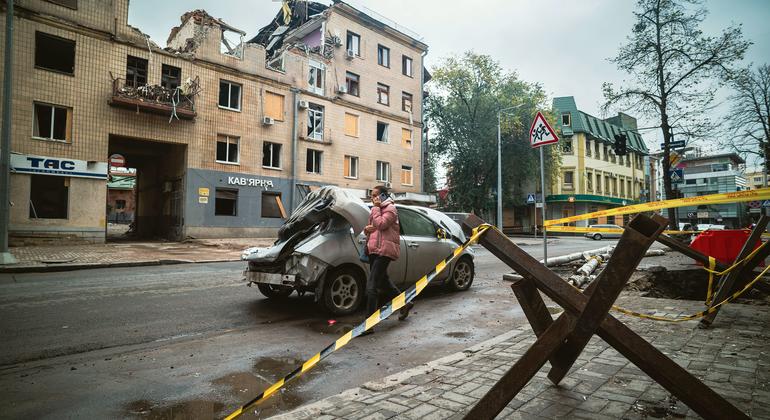According to the Commission of Inquiry on Ukraine, set up one year ago at the request of the Human Rights Council, Russian troops committed a “wide range” of violations across the country, many of which are war crimes.
These included attacks with explosive weapons in populated areas, wilful killings of civilians, unlawful confinement, torture, rape and other sexual violence, as well as unlawful transfers and deportations of children.
In addition, Russian attacks against Ukraine’s energy grid left millions without power in freezing temperatures.
Speaking in Geneva, chairperson Erik Møse said that the Commission found that “the waves of attacks from 10 October 2022 on Ukraine’s energy-related infrastructure by the Russian armed forces, and the use of torture by Russian authorities, may amount to crimes against humanity”, recommending further investigations.
Pattern of war crimes
For the report, which covers nine Ukrainian regions, investigators visited 56 towns and interviewed close to 600 witnesses.
The findings build on the Commission’s first report released in October last year, which found that war crimes had been committed by Russia in the regions of Kyiv, Chernihiv, Kharkiv, and Sumy, early on in the conflict.
Attacks on civilian infrastructure
According to the commissioners, Russian armed forces committed “indiscriminate and disproportionate” attacks in areas with a high concentration of civilians, which are violations of international humanitarian law.
These attacks impacted residential buildings, hospitals and shops, causing civilian casualties and indicating a “pattern of disregard on the part of Russian armed forces for the requirement to minimize civilian harm”.

The destruction of buildings and infrastructure in Ukraine has caused widespread environmental damage.
Need for further investigations into systematic torture
A key finding of the report relates to “widespread” unlawful confinement in areas controlled by Russian armed forces, going hand in hand with “consistent” methods of torture by Russian authorities.
Commissioner Pablo de Greiff said that Russian authorities used torture in a “systematic” manner in the areas investigated by the Commission, and that there were “elements of planning and availability of resources” indicating that the Russian authorities may have committed crimes against humanity.
He added that the Commission recommended further investigations “to ascertain whether those violations have been committed in furtherance of a specific policy.”
Sexual violence and deportation of children
The report highlights “numerous” instances of rape and sexual violence committed by Russian military personnel, notably during house searches in towns that came under their control, and in detention. Commissioner Jasminka Džumhur said that the victims were men, women and children from four to 82 years old.
Another war crime found to have been committed by the Russian authorities is the transfer and deportation of children who lost their parents or were separated from them, from Ukraine to Russia. The report states that these transfers “were not justified by safety or medical reasons”, and are thus contrary to international humanitarian law.
According to witnesses interviewed by the Commission, “many of the younger children transferred were not able to establish contact with their families and might lose contact with them indefinitely”.
The Commission also documented a “limited number” of violations committed by Ukrainian armed forces, including two incidents qualifying as war crimes, where Russian prisoners of war were shot, wounded and tortured.
Need for accountability
The report highlights the “deep loss and trauma” of survivors and recommends that all perpetrators of violations and crimes are held accountable through judicial proceedings in accordance with international human rights standards, “either at the national or the international level”.
The Commission also made calls for a “comprehensive” approach to accountability that includes both criminal responsibility and the victims’ right to truth, reparation, and non-repetition.



